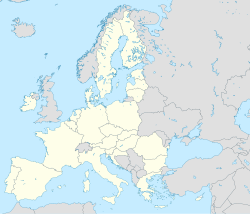 | |
 SRB head office in Brussels | |
| Board overview | |
|---|---|
| Formed | January 1, 2015 |
| Type | European banking union EU agency |
| Jurisdiction | European Union |
| Headquarters | Treurenberg 22, 1049 Brussels, Belgium 50°50′52″N4°21′44″E / 50.84776°N 4.36222°E |
| Employees | ~465 |
| Board executives |
|
| Key documents | |
| Website | www |
| Map | |
The Single Resolution Board (SRB) is an EU agency that was established in Brussels in 2015 as part of the broader set of reforms known as the banking union. It acts as the bank resolution authority for a subset of banks in the euro area and as the institutional hub of the Single Resolution Mechanism (SRM). Resolution is the restructuring of a bank by a resolution authority through the use of resolution tools in order to safeguard public interests, including the continuity of the bank's critical functions and financial stability, at minimal costs to taxpayers.
